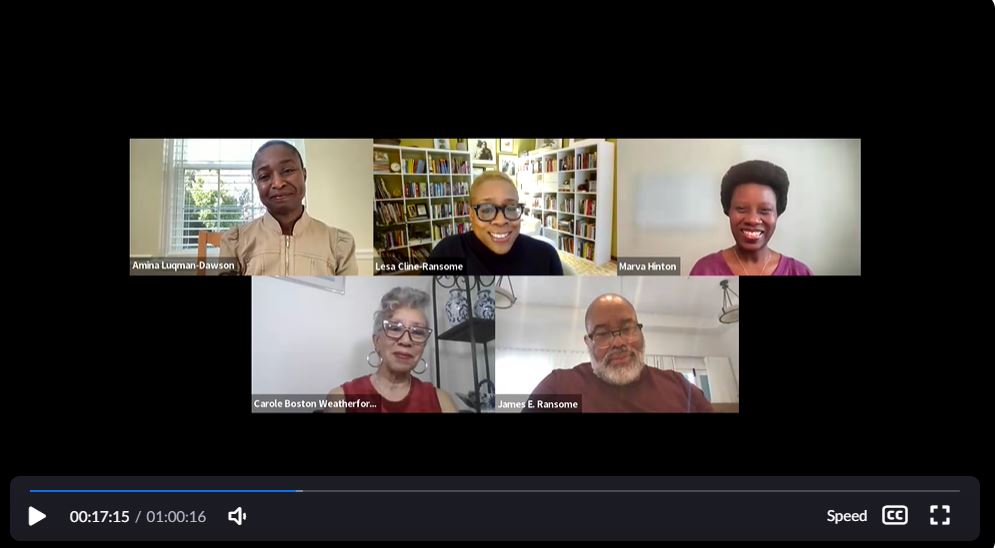The Art of Critical Fabulation | Fact-Finding and Black History Webcast
Authors Amina Luqman-Dawson, Lesa Cline-Ransome, Carole Boston Weatherford, and illustrator James Ransome discuss their research process and how they use creative license to tell stories.
 |
The 'Fact-Finding and Black History' webcast with (clockwise from top left) Amina Luqman-Dawson, Lesa Cline-Ransome, moderator Marva Hinton, James Ransome, and Carole Boston Weatherford. |
Exhaustive research is the foundation for nonfiction and historical fiction. But creating books about Black history and Black historical figures often requires deep dives into research combined with a little bit of informed imagination.
“I engage in something called critical fabulation,” Carole Boston Weatherford said during the February 1st SLJ webcast, “Fact-Finding and Black History,” a panel discussion with Weatherford, Amina Luqman-Dawson, Lesa Cline-Ransome, and James Ransome. “That's a term coined by scholar and sociologist Saidiya Hartman, and that means when the facts run cold then you take the facts and you have creative license to embellish them.”
Weatherford was doing that before she knew Hartman’s term. She was putting words into the mouths of people whose words were not recorded and taking creative license while seeking some more spiritual inspiration.
“I ask the ancestors to speak to and through me,” said Weatherford, author of more than 70 books including Kin, Unspeakable: The Tulsa Race Massacre, Caldecott winner Freedom in Congo Square, and Newbery Honor title BOX: Henry Brown Mails Himself to Freedom.“So there's a little mysticism involved as well, but I don't feel limited at all by the limits of the archives. I push past them.”
The term critical fabulation was new to the rest of the panel, but the practice of it wasn’t.
“Well, I'm also using critical fabulation—I just jotted that down, Carol, thank you so much for that,” Cline-Ransome said. “I confronted the issue when I was working on a book about pit schools: schools that [enslaved] people used when they would sneak out late at night from slave quarters. They would dig these deep, deep holes in the ground and learn to read and write in these pit schools that they created. Of course, these are schools and things that people did in secret.”
Keeping these activities secret was a key to survival for the enslaved, said Cline-Ransome, which meant few if any written records.
“So we have to try to imagine these events,” she said. “I took the little information I found about the schools, which is essentially a couple of paragraphs that piece together slave narratives, [and information] I had found about learning to read and write in secret and used critical fabulation to create a historical fiction book about how the slaves learned in secret. Often you have to piece things together.”
Cline-Ransome’s Light in the Darkness: A Story about How Slaves Learned in Secret was illustrated by her husband James Ransome, who often uses critical fabulation in illustrations—cross-referencing what he knows about a time period with what he has found about a particular subject then making “educated guesses.”
“I never like to say that my pieces are historically correct. [It’s the] best I could do at that time,” he said. “If I make a mistake, hopefully I learn, and the next book on that subject is corrected.”
Luqman-Dawson noted that some of her early struggles while writing 2023 Newbery winner Freewater involved leaning too heavily on the material she had solid research on, as opposed to imagining the Freewater world she was supposed to be writing about. It took time, but she eventually got to a place where she felt comfortable taking what she knew about the Great Dismal Swamp, on which Freewater was based, and adding “nuggets” of information from similar settlements she read about. She "felt wonderful" hearing the others follow a similar process.
“I felt the same way, like, ‘Well, here's what I know, and then here's what we can kind of infer, and then here's what I'm going to create,’” she said. “I think creating the life, creating the reality, creating the humanity, and instilling that, is more important than any record you're going to find.”
These writers and illustrators won't be stopped by incomplete documentation. Their books exist to flesh out Black history and give voice and agency to people whose lives and history were silenced for generations.
“My takeaway from Kin is that knowing your history is generational wealth,” said Weatherford. “Usually, generational wealth is considered something we can place a monetary value on, but history is generational wealth as well, and that’s why it has been stripped from us. [Arthur] Schomburg said, ‘History must restore what slavery took away,’ so we’re still trying to repair that.”
There was so much more to this discussion moderated by Horn Book editor Marva Hinton. For those who didn’t catch the webcast live, you can still register and watch on demand.
RELATED
The job outlook in 2030: Librarians will be in demand
The job outlook in 2030: Librarians will be in demand
ALREADY A SUBSCRIBER? LOG IN
We are currently offering this content for free. Sign up now to activate your personal profile, where you can save articles for future viewing





Add Comment :-
Be the first reader to comment.
Comment Policy:
Comment should not be empty !!!